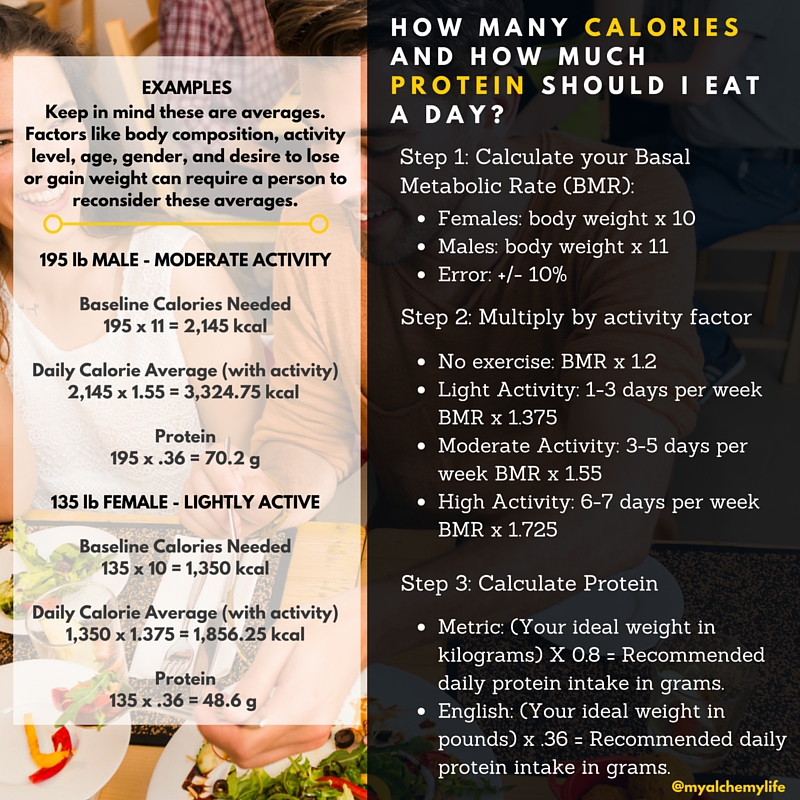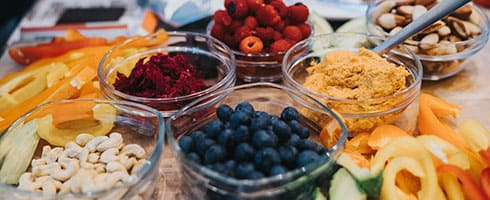Average daily calorie range is around 2,000 kcal for an average person. However factors like body composition, activity level, age, gender, and desire to lose or gain weight can require a person to reconsider how much they eat.
Note: it is not recommended to have less than 1,200 kcal/day for a female and 1,800 kcal/day for a male as it can slow down metabolism.
How to Calculate Your Daily Calorie Requirement
Step 1. Calculate the Basal Metabolic Rate (BMR) BMR. BMR is the baseline number of calories a resting body needs to support physiologic processes.
- Females: body weight x 10
- Males: body weight x 11
- Error: +/- 10%
Example:
- 150 lb female needs 1,500 kcal per day to cover her BMR (+/- 150 kcal).
- 150 lb male needs 1,550 kcal per day to cover his BMR (+/- 155 kcal).
Step 2. Multiply by Activity Factor. More calories are needed to when a person is active to help support recovery.
- No Exercise: BMR x 1.2
- Light Activity: Light exercise or sports 1-3 days per week BMR x 1.375
- Moderate Activity: Moderate exercise or sports 3-5 days per week BMR x 1.55
- High Activity: Strenuous exercise or sports 6-7 days per week BMR x 1.725
Examples:
- 235 lb male, walks 30 minutes 3 times a week (light activity) BMR = 235 x 11 = 2,585 kcal Total daily calories = 2,585 x 1.375 = 3,554 kcal
- 110 lb female, commutes to work 2 hours per day, has a desk job, doesn’t exercise (sedentary) BMR: 110 x 10 = 1,100 Total daily calories: 1,100 x 1.2 = 1,320 kcal
How to Calculate your Daily Required Protein Intake
Calculate Your Protein Needs
Here’s the formula:
Metric: (Your ideal weight in kilograms) X 0.8 = Your recommended daily protein intake in grams.
English: (Your ideal weight in pounds) x .36 = Your recommended daily protein intake in grams.
How to Easily Track Your Calories
The best diet and exercise tracking app that I have found is myfitnesspal.com/. I like this app because the free version has a ton of great features and it allows you to track fiber. It has both an online, and mobile phone app, and the food database is really large, making it easy to find and track your food.
Metabolism
An additional factor to consider in this whole calorie discussion is a persons metabolism. Metabolism is the name given to the set of chemical processes that your body completes every day that keep you alive. This includes things like converting food into energy and manufacturing chemicals that you cells need to perform internal processes. Many factors effect a persons unique metabolic rate including: body size, age, gender, extreme dieting, body composition, and gender.
What is your metabolism?
- Fast metabolism: Person is hungry in the morning, strong appetite, needs more warm & dense foods (proteins & fats)
- Slow metabolism: Person is not hungry in the morning (more at noon), weaker appetite, benefits from Booster Foods and less starches
- Balanced metabolism: Person has moderate and even hunger and appetite
How to increase metabolism?
- Get enough protein. Your body uses the protein to build and repair muscle tissue. By getting enough protein in your diet your body has what it needs to manufacture and repair your muscle cells.
- Build muscle mass. Building muscle will increase your lean body mass, which in turn will increase your resting metabolic rate.
- Increase your daily activity. Any activity will help to preserve your lean body mass – walking, swimming, karate, bike riding, etc. Bumping up the intensity and frequency of your activity will help to offset any dips in your metabolic rate as a result of cutting your calorie intake.


